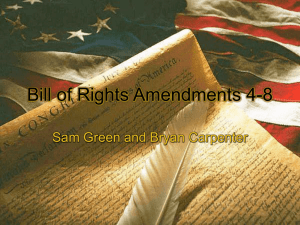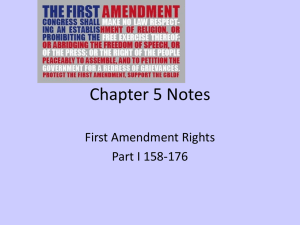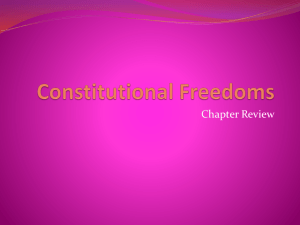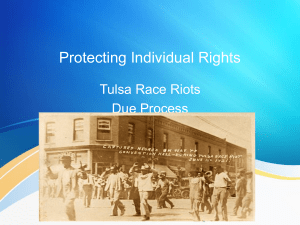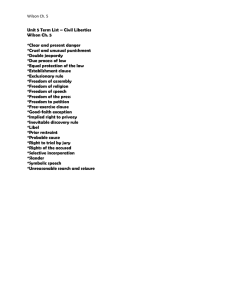Civil Rights Test
advertisement
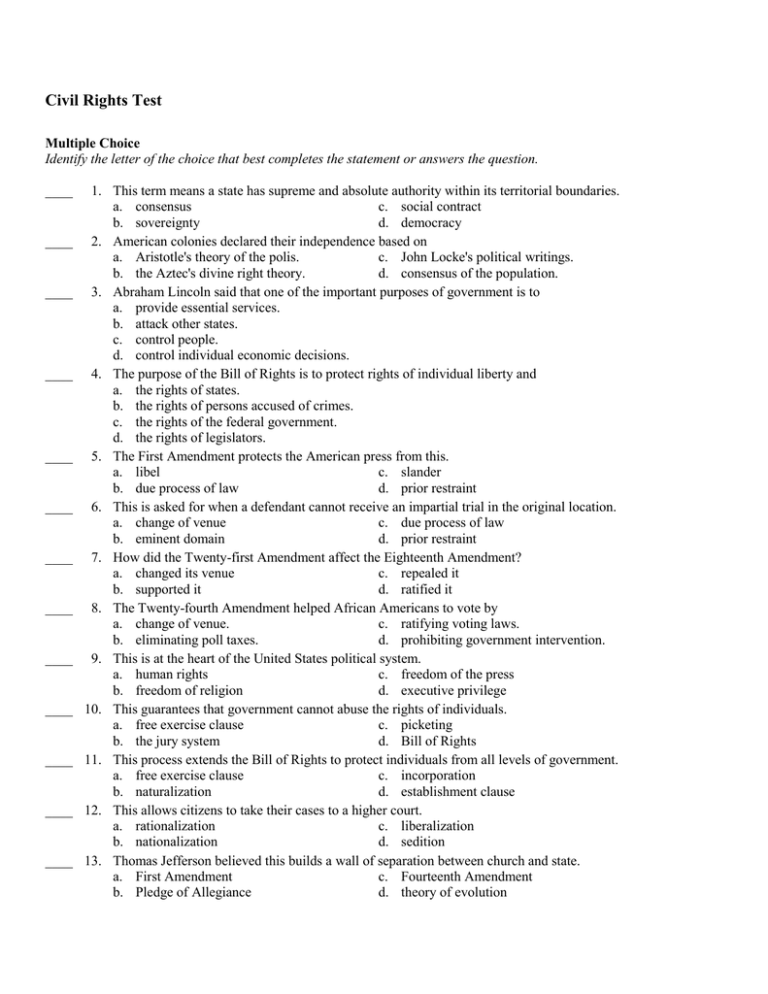
Civil Rights Test Multiple Choice Identify the letter of the choice that best completes the statement or answers the question. ____ ____ ____ ____ ____ ____ ____ ____ ____ ____ ____ ____ ____ 1. This term means a state has supreme and absolute authority within its territorial boundaries. a. consensus c. social contract b. sovereignty d. democracy 2. American colonies declared their independence based on a. Aristotle's theory of the polis. c. John Locke's political writings. b. the Aztec's divine right theory. d. consensus of the population. 3. Abraham Lincoln said that one of the important purposes of government is to a. provide essential services. b. attack other states. c. control people. d. control individual economic decisions. 4. The purpose of the Bill of Rights is to protect rights of individual liberty and a. the rights of states. b. the rights of persons accused of crimes. c. the rights of the federal government. d. the rights of legislators. 5. The First Amendment protects the American press from this. a. libel c. slander b. due process of law d. prior restraint 6. This is asked for when a defendant cannot receive an impartial trial in the original location. a. change of venue c. due process of law b. eminent domain d. prior restraint 7. How did the Twenty-first Amendment affect the Eighteenth Amendment? a. changed its venue c. repealed it b. supported it d. ratified it 8. The Twenty-fourth Amendment helped African Americans to vote by a. change of venue. c. ratifying voting laws. b. eliminating poll taxes. d. prohibiting government intervention. 9. This is at the heart of the United States political system. a. human rights c. freedom of the press b. freedom of religion d. executive privilege 10. This guarantees that government cannot abuse the rights of individuals. a. free exercise clause c. picketing b. the jury system d. Bill of Rights 11. This process extends the Bill of Rights to protect individuals from all levels of government. a. free exercise clause c. incorporation b. naturalization d. establishment clause 12. This allows citizens to take their cases to a higher court. a. rationalization c. liberalization b. nationalization d. sedition 13. Thomas Jefferson believed this builds a wall of separation between church and state. a. First Amendment c. Fourteenth Amendment b. Pledge of Allegiance d. theory of evolution ____ 14. Schools operated by a church or religious group are called a. state schools. c. public schools. b. parochial schools. d. secular schools. ____ 15. This allows student religious groups to meet in high schools receiving federal funds. a. free exercise clause c. Equal Access Act b. Engle v. Vitale d. establishment clause ____ 16. These cases illustrate how the Court can change its interpretation of the Constitution. a. access cases c. aid to parochial schools cases b. federal lunch program cases d. flag salute cases ____ 17. The verbal expression of thought and opinion before an audience is a. pure speech. c. symbolic speech. b. libel. d. slander. ____ 18. Expression involving actions and symbols is a. slander. c. pure speech. b. libel. d. symbolic speech. ____ 19. This urges resistance to lawful authority or advocates the overthrow of the government. a. slander c. libel b. defamatory speech d. seditious speech ____ 20. This holds that First Amendment freedoms are more fundamental than other freedoms. a. sedition laws c. preferred position doctrine b. establishment clause d. bad tendency doctrine ____ 21. These give reporters protection against being forced to disclose confidential information. a. gag orders c. prior restraint laws b. sequester laws d. shield laws ____ 22. These have more First Amendment protection than broadcasters, but less than newspapers. a. advertisers c. radio programs b. cable operators d. motion picture producers ____ 23. The Court ruled that liberty of expression by these means is guaranteed by the First and Fourteenth amendments. a. electronic messages c. radio and television stations b. motion pictures d. infomercials ____ 24. This is considered commercial speech and is given less protection under the First Amendment. a. a radio or television program c. advertising b. motion pictures d. Web sites ____ 25. Without this basic freedom, there would be no political parties. a. freedom of religion c. freedom to libel b. freedom of the press d. freedom of assembly ____ 26. Holocaust survivors in Skokie illustrated a free speech and assembly problem called the a. public veto law. c. heckler's veto. b. freedom of assembly veto. d. parade permit law. ____ 27. Unless there is a labor dispute, the Court has upheld laws that prohibit a. picketing. c. assembly on public property. b. protection for marchers. d. assembly on private property. ____ 28. When one qualified individual loses out to another because of race, ethnicity, or gender, it may be because of a. the Washington ruling. c. the Civil Rights Act. b. the Nineteenth Amendment. d. affirmative action policies. ____ 29. This act requires federal agencies to provide citizens access to public records. a. Security Classification Act c. Freedom of Information Act ____ 30. ____ 31. ____ 32. ____ 33. ____ 34. b. Woman's Equality Act d. Civil Rights Act This law has greatly increased the government’s power to prosecute people suspected of terrorism. a. The USA Patriot Act c. The Freedom of Information Act b. The Sunshine Act d. The Civil Rights Act In this type of contract, the terms are specifically stated. a. civil law contract c. expressed contract b. implied contract d. valid contract In this proceeding, the judge reads the formal charge against the defendant. a. arraignment c. grand jury b. plea bargaining session d. sentence If a jury is unable to make a decision, it is called a a. grand jury. c. petit jury. b. hung jury. d. verdict. The punishment to be imposed on a guilty defendant is called a a. verdict. c. sentence. b. felony. d. misdemeanor. Completion Complete each sentence or statement. 35. The ____________________ protects Americans’ right to worship as they please. 36. The ____________________ prohibits the government from taking weapons away from citizens. Many state constitutions also guarantee the right to bear arms. 37. The Fifth Amendment states that government may not deprive persons of their life, liberty, or property without ____________________. 38. The ____________________ bans cruel and unusual punishment for crimes. 39. The Thirteenth Amendment outlaws ____________________. 40. Words in the Declaration of Independence express the belief that people have ____________________ simply because they are people. 41. The ____________________ of the Bill of Rights means that United States citizens in every part of the country have the same basic rights. 42. The establishment clause of the ____________________ states that "Congress shall make no law respecting the establishment of religion." 43. The free exercise clause prohibits government from unduly interfering with the free exercise of ____________________. 44. The Supreme Court uses the so-called Lemon test to decide whether state or federal aid to ____________________ is constitutional. 45. In Wisconsin v. Yoder, the Court decided that the state could not force ____________________ children to attend school beyond the eighth grade. 46. Burning the American flag is an example of ____________________ speech. 47. If a conflict between free expression and public safety occurs, the Supreme Court relies on the _________________________ rule. 48. In 1957 the Court narrowed its definition of ____________________ by ruling that it is legal to express the opinion that the government ought to be overthrown. 49. The Court has limited the protection of public figures from ____________________ speech. 50. In Thornhill v. Alabama (1940), the Court ruled that peaceful picketing was a form of ____________________. 51. The ____________________ veto involves limits on the free speech of unpopular groups by potentially violent public reaction. 52. Opponents of affirmative action complain of __________________________ when qualified individuals lose out to persons chosen because of their race, ethnicity, or gender. 53. The Civil Rights Act of 1964 banned ____________________ discrimination based on gender. 54. The Equal Employment Opportunity Act of 1972 made ____________________ discrimination in the workplace illegal. 55. In The USA Patriot Act Congress greatly increased the powers of the federal government to prosecute people suspected of _________________. Matching Match each item with the correct statement below. a. First Amendment d. Bill of Rights b. libel e. slander c. search warrant ____ ____ ____ ____ ____ 56. 57. 58. 59. 60. first 10 amendments protects freedom of speech false speech damages a person in writing based on probable cause Match each item with the correct statement below. a. United States citizens b. first ten amendments c. person born or naturalized in the U.S. d. Fourteenth Amendment e. human rights ____ ____ ____ ____ ____ 61. 62. 63. 64. 65. citizen keepers of the rights basic freedoms due process Bill of Rights Match each item with the correct statement below. a. opened meetings to the public d. security classification system b. right to privacy e. gave women the right to vote c. transcript ____ 66. Nineteenth Amendment ____ ____ ____ ____ 67. 68. 69. 70. secret government documents Sunshine Act summary report Bill of Rights and Fourteenth Amendment Match each item with the correct statement below. a. tort d. offer b. contract e. plaintiff c. defendant ____ ____ ____ ____ ____ 71. 72. 73. 74. 75. set of voluntary promises promise that something will or will not happen wrongful act person who brings charges in a lawsuit person being sued Match each item with the correct statement below. a. bench trial d. verdict b. felonies e. criminal justice system c. petty offenses ____ ____ ____ ____ ____ 76. 77. 78. 79. 80. courts, judges, lawyers, police, prisons minor crimes serious crimes trial without a jury jury decision
